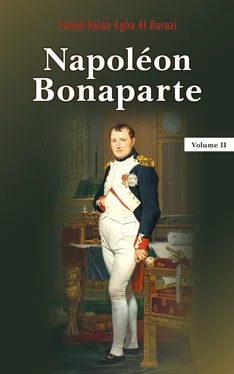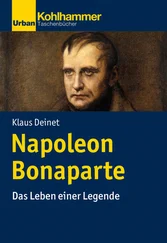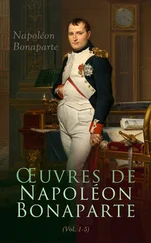Fahed Aslan Agha Al Barazi - Napoléon Bonaparte
Здесь есть возможность читать онлайн «Fahed Aslan Agha Al Barazi - Napoléon Bonaparte» — ознакомительный отрывок электронной книги совершенно бесплатно, а после прочтения отрывка купить полную версию. В некоторых случаях можно слушать аудио, скачать через торрент в формате fb2 и присутствует краткое содержание. Жанр: unrecognised, на английском языке. Описание произведения, (предисловие) а так же отзывы посетителей доступны на портале библиотеки ЛибКат.
- Название:Napoléon Bonaparte
- Автор:
- Жанр:
- Год:неизвестен
- ISBN:нет данных
- Рейтинг книги:4 / 5. Голосов: 1
-
Избранное:Добавить в избранное
- Отзывы:
-
Ваша оценка:
- 80
- 1
- 2
- 3
- 4
- 5
Napoléon Bonaparte: краткое содержание, описание и аннотация
Предлагаем к чтению аннотацию, описание, краткое содержание или предисловие (зависит от того, что написал сам автор книги «Napoléon Bonaparte»). Если вы не нашли необходимую информацию о книге — напишите в комментариях, мы постараемся отыскать её.
Napoléon Bonaparte — читать онлайн ознакомительный отрывок
Ниже представлен текст книги, разбитый по страницам. Система сохранения места последней прочитанной страницы, позволяет с удобством читать онлайн бесплатно книгу «Napoléon Bonaparte», без необходимости каждый раз заново искать на чём Вы остановились. Поставьте закладку, и сможете в любой момент перейти на страницу, на которой закончили чтение.
Интервал:
Закладка:
As for Napoléon, the initial success of his generals in Spain in 1810 left him more focussed on his private life, with the newly expecting empress Marie-Louise. Soon, he is informed that Walewska has delivered a healthy boy, the fruit of their weeks together at Schonbrunn Palace. He sends for her and when she arrives, he lodges her in palatial accommodations and showers her with gifts. He dotes over the baby and caresses him. He makes him Count of the Empire and appoints the arch-chancellor Cambacérès his guardian. To add to his joy, he is informed that Eleanore Denuelle, a lady in waiting to his sister Caroline Murat, with whom he had an affair begets him a son, whom he makes Count de Léon. They both reach very prominent positions during the reign of his nephew Napoléon III’s second empire.
“Napoléon’s happiness with the news of the empress’ expectancy is beyond description,” writes Metternich to Vienna. The empress’ expectancy is solemnly announced to the Senate and the nation. People throng the streets and burst into acclamations, “Vive le Emperor!” Churches were crowded with people praying for the expected heir to the throne. When the empress is in labour all of Paris knows, and church bells announce the news all over France. People everywhere say their solemn prayers for the safety of mother and child. Throughout the night, Napoléon is inseparable from the empress’ bedside. When he had temporarily withdrawn to the adjacent salon, the Doctor brings him the unsettling news that the empress is experiencing delivery complications, and as a last resort a choice may have to be made between mother and child.
“The mother’s life comes first! Carry out your duty as you would to any ordinary citizen’s wife in labour.”
Two hours later, a healthy baby is born, and the mother is in good health. The emperor is beside himself with joy; when the gun salute counts 21, Paris responds rapturously with great ovation. It’s a baby boy. Meneval, the emperor’s secretary, notes: “There are tears in the emperor’s eyes as he roams in his own thoughts.”
CHAPTER 27
SUCCESS AND FOREBODINGS
In 1810, Napoléon was at the pinnacle of his success; his long-awaited dream for a child of his own, a legitimate heir to the throne, has now been realized. At forty-three, he finds happiness, and despite the onerous responsibilities of state affairs, his new life as a father has brought him tranquillity and solace. Marie-Louise, young and easygoing, provides him with the unpretentious home atmosphere that he yearns for. She gets on very well with the other members of his immediate family. He dotes over his little son, plays with him and watches the infant crawling on the floor while he sits at breakfast, and affectionately caresses him.
This newfound happiness for a man of genius is the only solace that he finds when other ominous news is received. The seemingly endless Peninsular war in Spain and Portugal, where over 250,000 French men are tied down, brings him unsettling news of atrocities. Reports of captured French officers having their eyes gouged out, and spit upon. Captured French soldiers and female Spanish collaborators were tortured and disembowelled. Captain Charles Francois, an eyewitness, reported that Spanish collaborating women were disembowelled from the vagina to the navel and their breasts hacked off. Spaniards place live French officers between two boards and saw them in two; others had their fingers, hands, arms and legs chopped off, others were hung upside down over fires, their heads roasted over flames. The French responded by summary execution to the populaces of villages suspected of insurrection. The Spanish Painter Goya eternalized these atrocities in paintings that can still be found at the Del Prado Museum in Madrid.
Massena’s retreat from the Torres Vedras line, forced by famine and disease, infuriates the emperor. He is recalled and promptly replaced by Napoléon’s old comrade in arms, Marshal Marmount. But this change of command was no solace to the French troops and their officers; only the emperor, his personal presence on the battlefield could turn events around and bring the campaign to an end. Instead at 43, he is a happy father; he spends time with his little boy, takes him in his arms and sets him down on the floor amongst scattered toy soldiers and lets the two-year-old child play havoc with the soldiers. He tells Berthier “My son is strong and healthy. He is spirited and sensitive; he has my mouth and my eyes. He is everything I hoped for.”
In 1803, aged thirty-four, Napoléon became an Emperor; now at forty-three he has a two-year-old son, the heir to his empire. His main concern is the security and welfare of his child; he therefore decides that the Spanish affair must be resolved by his generals. He still has a standing army in Spain numbering a quarter million men, surely Wellington’s thirty thousand men will be annihilated. But Napoléon, the visionary, the military genius, had discounted the ardent spirit of the Spanish resistance fighters, often led by fanatically religious monks. This is not the kind of war that Napoléon’s marshals and generals are accustomed to; the incompetence of his brother, King Joseph, further compounds his problems. He therefore divides Spain into military districts, each administered by a general, and appoints Marshal Soult supreme commander. But even the renounced Soult, who in 1810 had captured Seville, Olivenca and Badajoz, early 1811, was unable to pacify the situation. So why did Napoléon persist in this futile campaign? It was his megalomaniacal dreams of world domination that surpassed even Charlemagne, and not wanting to be seen as having failed in Spain, while England and his enemies gloat over his failure. But there was still an even more poignant objective in his schemes: A United States of Europe under French Hegemony. In 1806, he established the federation of Rhine; now in 1810 practically the entire part of Western Europe is in the realm of the French Empire. In the Council of State, he declares, prophesising “All this will last as long as I do and no longer.” Prophetic words, yet despite this ominous situation of self destruction that he brings upon himself, Russia remains his second and most disastrous venture.
In the meantime, the ‘Continental System’ is taking it’s toll, a system which Napoléon envisaged would deprive England of her maritime commerce and therefore of her livelihood. True England was suffering, but so was France and Western Europe. English banks were hard hit and the English pound equalled seventeen Francs at the exchange rate; in Parliament, the opposition was against perpetuating the war, but the ruling majority, the war party, rebuffed the idea, encouraged by France’s reverses in Spain.
In July, August and October 1810, Napoléon signed four decrees cracking down on all commerce; “No ship from any European nation is permitted sail without an export-import license signed by French authorities.” All colonial produce was subject to heavy duties, including tobacco, tea, sugar, cocoa and coffee. Illicit colonial products found in any European country were to be destroyed forthwith; as a result, shiploads were confiscated and burnt in public. England, as a result of her refusal to peace advances, lost her European markets save for those countries that secretly or defiantly refused to comply with the ‘Continental System’. The Dutch, a nation of traditional traders and seamen, were amongst the worst affected by Napoléon’s system of embargo. Louis, Napoléon’s brother and King of Holland, had enough of his brother’s interference; he was angered by Napoléon’s annexation of Holland to France, but his protestations went on deaf ears. He abdicated in favour of his younger son and absconded to Austria on the pretext of illness. On finding out the whereabouts of his brother, Napoléon sent his own physician to care for him. This same brother, who accompanied Napoléon on his first campaign to Italy as an Aide-de-camp, trained as a gunner and saw action at Arcola and Rivoli and the siege of Mantua, was paternally cared for by Napoléon. He accompanied Napoléon to Egypt in 1798 and, after a short stay, was sent back to France after the capture of Alexandria with captured colors. In one sense, Napoléon had more hopes and compassion for his brother Louis than the rest of his kin. In June 1799, after his return from Egypt, he joined the Cavalry; four years later he was promoted general de brigade, and in March 1804 general de division. During the empire’. In 1805, he was given the command of the army of Holland with the title ‘Constable of the Empire’. A year later on 24 May 1806, he was crowned ‘King of Holland’; three years later, he commanded the Dutch Army against the failed English invasion at Walcheren. Unfortunately, in 1810, he fell out with Napoléon for disagreements over the implementation of the Continental System and abdicated in favour of his younger son.
Читать дальшеИнтервал:
Закладка:
Похожие книги на «Napoléon Bonaparte»
Представляем Вашему вниманию похожие книги на «Napoléon Bonaparte» списком для выбора. Мы отобрали схожую по названию и смыслу литературу в надежде предоставить читателям больше вариантов отыскать новые, интересные, ещё непрочитанные произведения.
Обсуждение, отзывы о книге «Napoléon Bonaparte» и просто собственные мнения читателей. Оставьте ваши комментарии, напишите, что Вы думаете о произведении, его смысле или главных героях. Укажите что конкретно понравилось, а что нет, и почему Вы так считаете.












